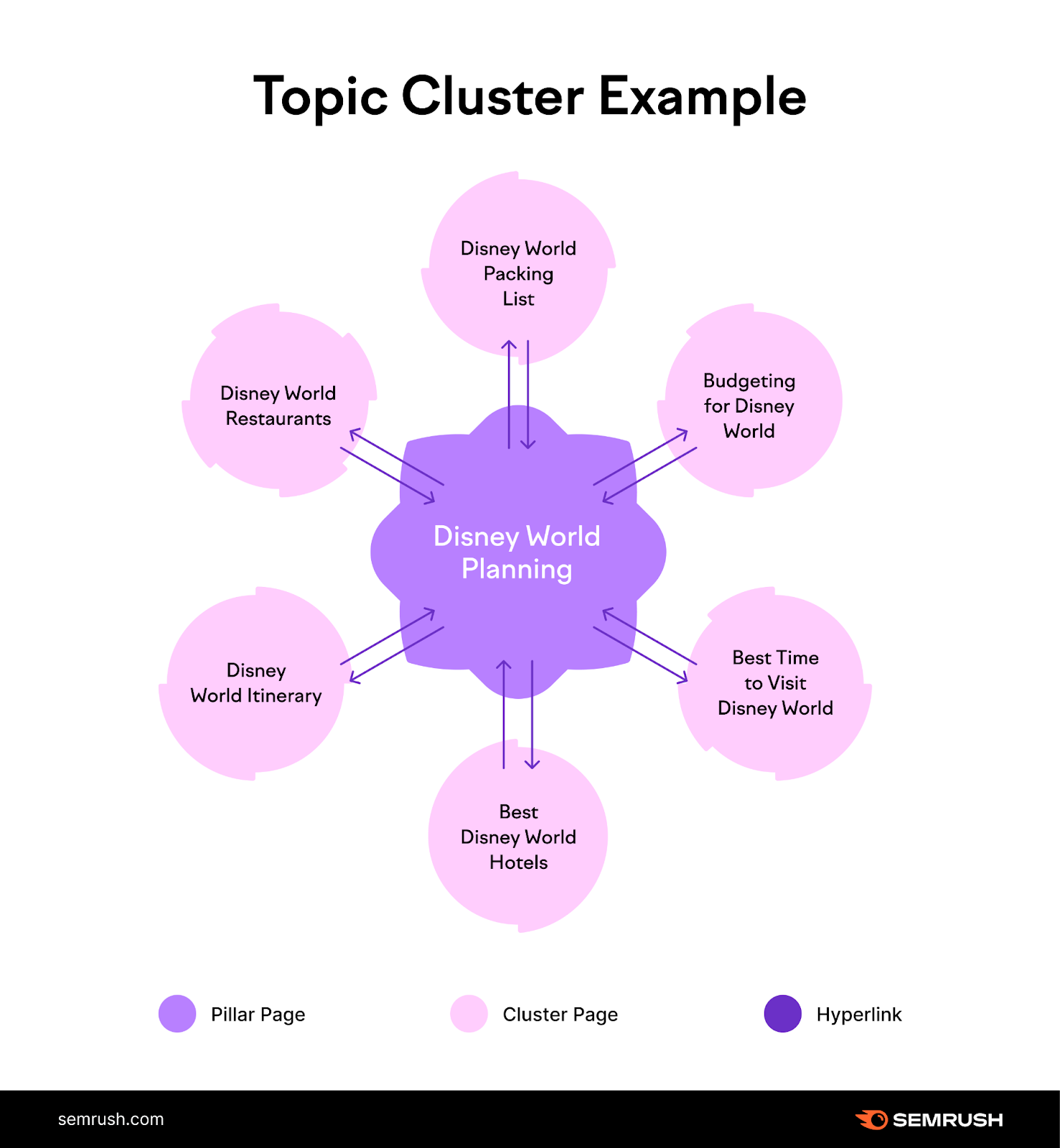 May 02, 2024
Persona
May 02, 2024
Persona
SEO isn’t always about creating loads of new content.
In fact, changing the way you organize your content can be just as fruitful for improving your higher education SEO strategy. That’s where topic clusters come in. With this tactic, you only have to focus on content creation of one page where your already-written blogs can live, all while quietly boosting that SEO.
What Are Topic Clusters?
These may be more familiar than you think.
A topic cluster is a group of thematically related pages on a website. Each cluster has a main pillar page that provides a broad overview of the topic and links to multiple other pages that cover subtopics.

Think of a nursing program page. You may have the main program page with a broad overview, but then you may also include links to courses, admission information, financial aid information, and events. That’s a topic cluster! You can (and should) also use the main program page as a pillar for your blogs. Do you have articles featuring a stand-out nursing professor? Do you have another article highlighting unique careers someone could have with this degree? Anchor them here.
This helps SEO because Google uses the E-E-A-T principle (Experience, Expertise, Authoritativeness, and Trustworthiness) to signal to its Quality Raters to evaluate a search engine results page (SERP). Simply put, the more quality content you publish on your topic, the more expertise you build, the more authority you’ll create, and the more keywords you can rank for. Plus, connecting all your pages in one place makes it easier for search engines to crawl through quickly.
Program pages are a great place to start, but you can also create topic clusters within your blog.
How to Choose Topic Clusters
Find Patterns in Existing Content
Begin with the last year — are there any topic patterns your school writes about frequently? Some of the most common we see are student spotlights, faculty highlights, and research accomplishments, but you may also have blogs on admission tips, student life, and more. These are all great groupings to inspire a pillar page.
Identify Students’ Challenges
Strong marketing should solve a user challenge. So, let’s start there. What are 5-10 roadblocks prospective students have that you can address? Is it that admission feels too complicated? Create an Admission Guide topic cluster linking to all the blog articles about deadline reminders, admission events, aid tips, and more. Are they nervous about meeting new people and making new friends? Create a community topic cluster linking to all of the articles about fun events, student interviews about the community, club highlights, etc. Remember, these should be broad topics that many articles can fit under.
Validate with Keyword Research
You have some ideas of what could be good topic clusters, but how can you be so sure?
Easy: keyword research.
Keyword research is a great way to understand what students (or parents!) seek answers to. If you find that many keywords focus on MBA admission requirements, MBA costs, and interview prep, then an MBA admission cluster is a good idea! The key is that you want to create content in areas your university can compete in, so no need to take the keywords literally. Use them as a guide to talk about what makes your school stand out — like how affordable your MBA program is, assistantship spotlights, or an admission interview guide.
Here are some free keyword research tools we love:
- SEMRush
- Answer the Public
- Keyword Surfer
- Google Trends (more for trends vs. specific keywords)
While you’re researching, add some keywords to your current pages just to give them a little SEO refresh. You’ll also want to add a few lines in there linking to the other blogs in the cluster. More connections among your own content=better SEO! (And republishing them will also give you a little bump!)
Bonus: Using Topic Clusters as New Blog Inspiration
We know you’re always looking for new ways to create helpful content, and now you can let your clusters be the guide. See where you have any gaps in information and fill them in with new posts. Better yet, plan on adding one piece of content to each of your clusters every month — or more! Here are two more quick tips:
- Now that you know the E-E-A-T principle, try prioritizing content about student experience and faculty expertise to build that engaging, trustworthy, authoritative content. Double bonus if the content is first-person.
- Still got those keywords up? Awesome! All you have to do is focus on just 1-2 keywords to create an optimized blog.
Topic clusters really can be your SEO savior, especially if your university is short on resources. All it takes is giving that old content a fresh new home.
Want the specialists to take the wheel? Carnegie’s SEO team has you covered. Reach out and start a conversation to learn more!
